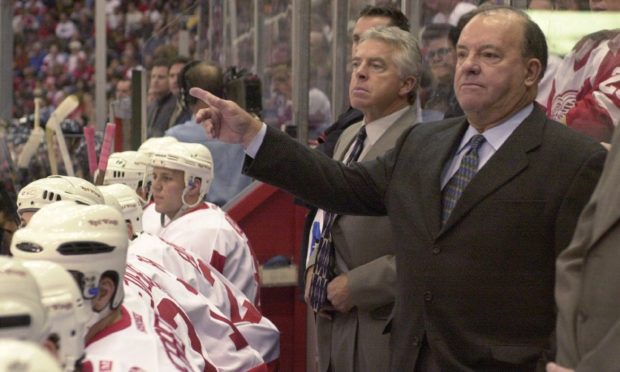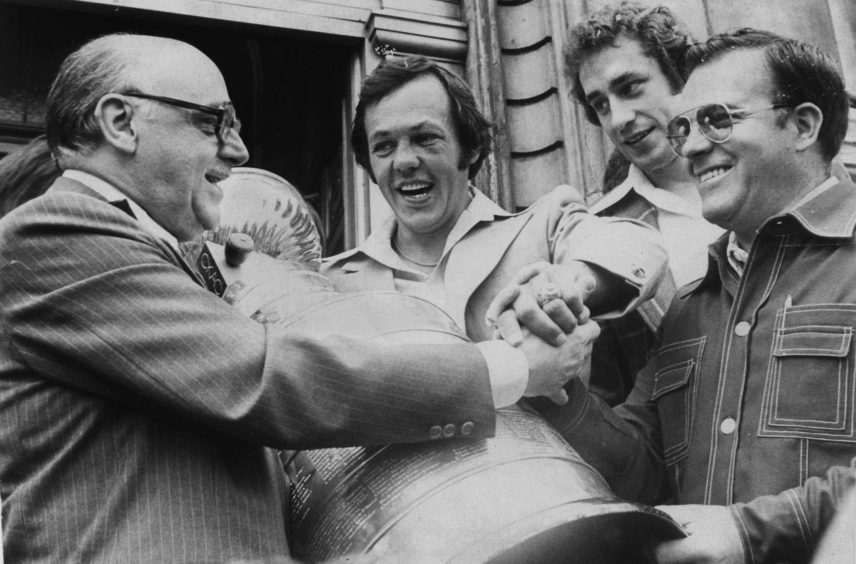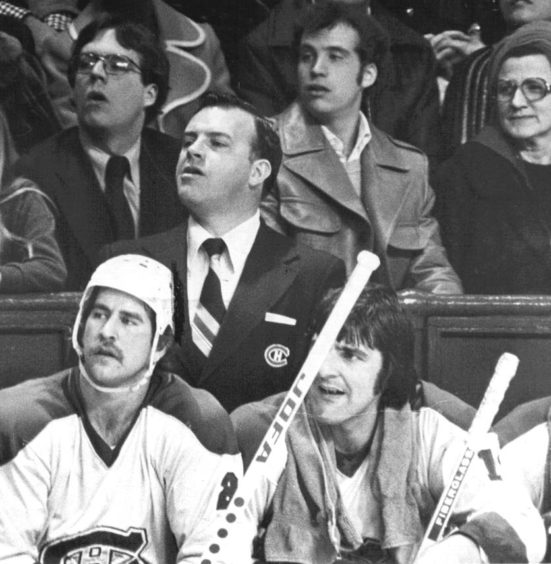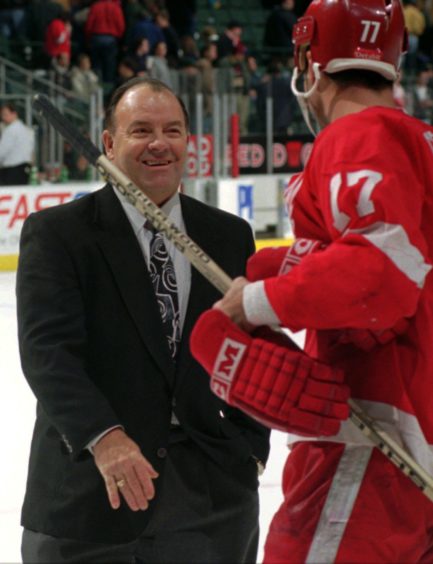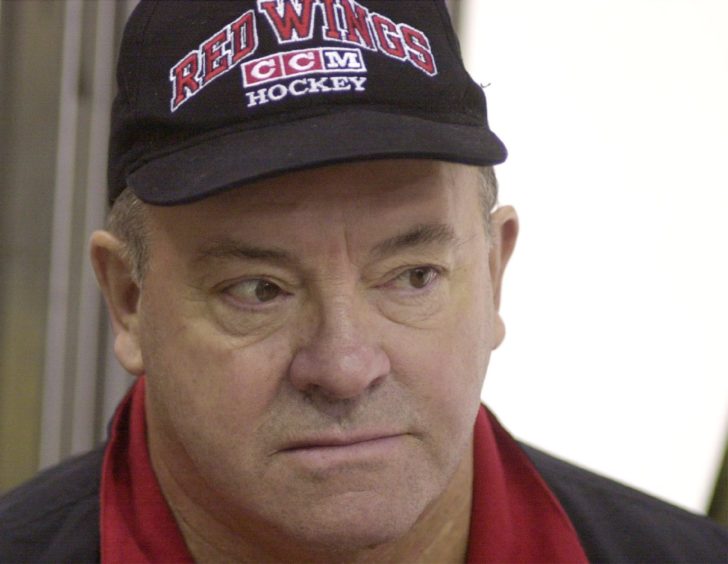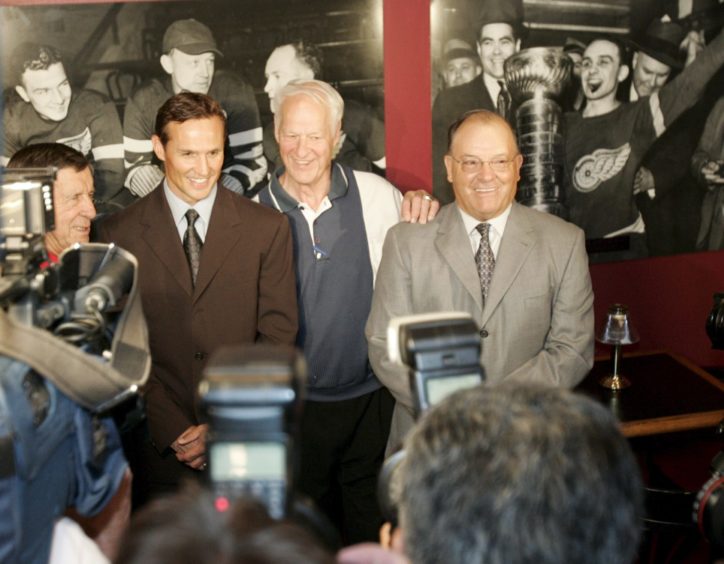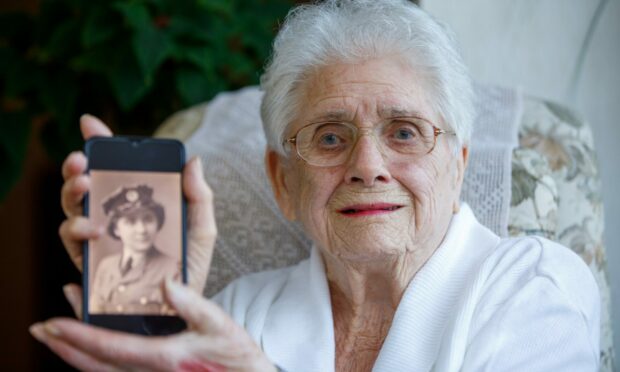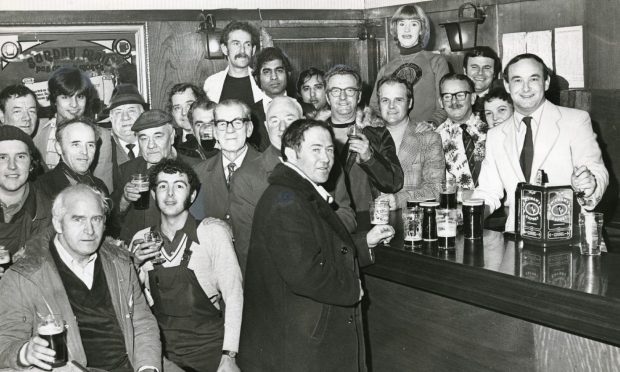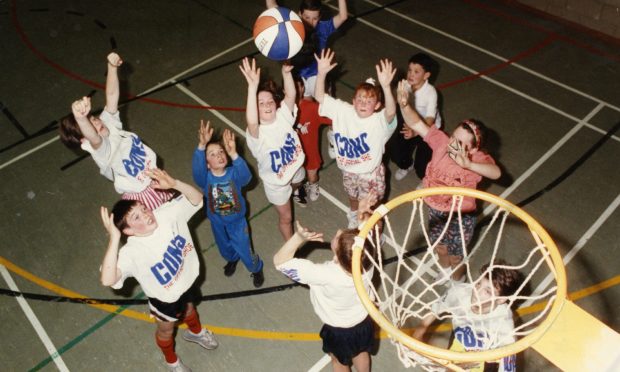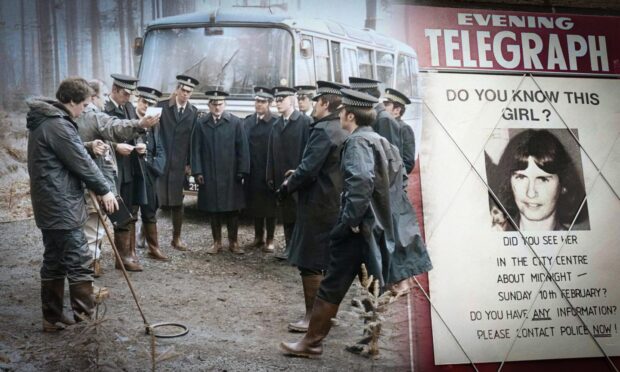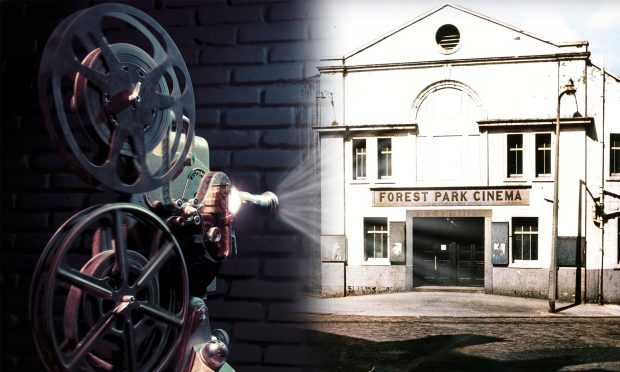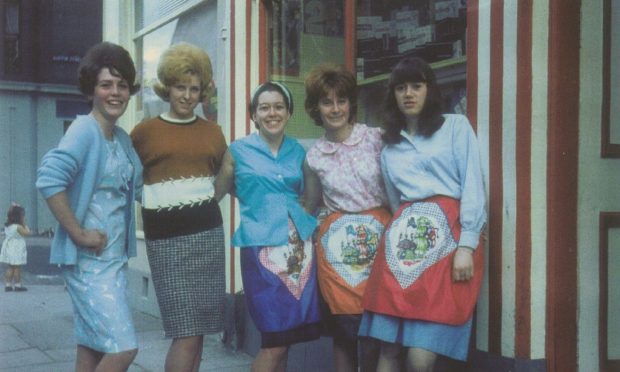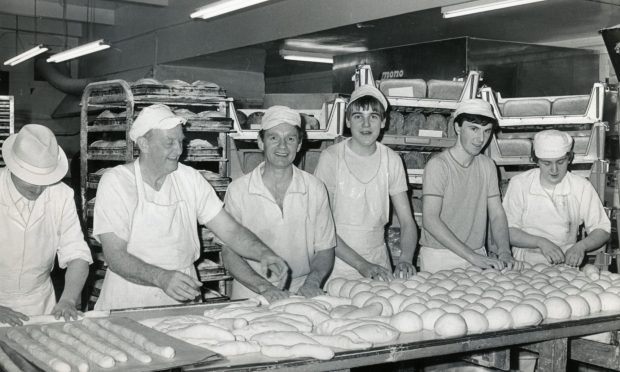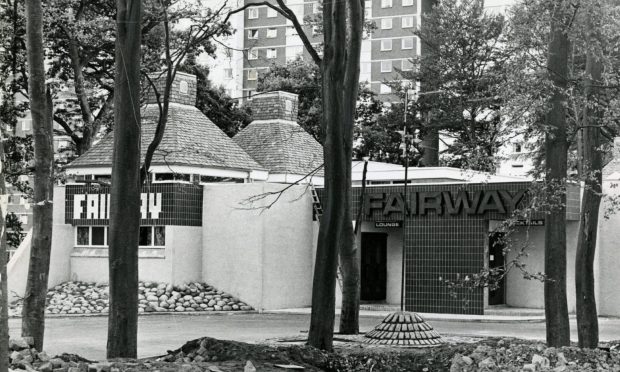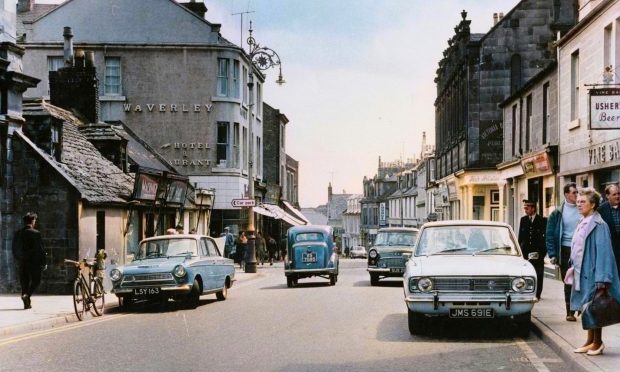He is the greatest head coach in NHL history who was inducted into Canada’s Walk of Fame.
Scotty Bowman has a record that may never be surpassed.
It includes an unprecedented nine Stanley Cup championships with three different teams.
Bowman, who retired aged 68 after the 2001-02 season, also holds records for the most regular-season games coached (2,141); most wins in the regular season (1,244); and most wins in the play-offs (223).
Sports Illustrated described Bowman as the best coach ever in any of North America’s major professional sports.
The magazine said that no other coach has been as successful with as many teams or as many generations of athletes.
But few people are aware that he is a son of Angus who is proud of his Scottish roots.
His father John Bowman was a blacksmith in Forfar but everybody knew him as Jack.
Bowman’s mother Jean was from Monikie.
They fell in love and got married.
They emigrated to Canada in 1929 during The Great Depression.
Jack had no formal education and toiled as a blacksmith for the railroad while his wife worked as a grocery store clerk.
Bowman was one of five children born to the family who grew up in a working class suburb in Montreal.
The Bowman family lived on a street lined by 26 tenements, 13 on each side, six families per tenement, more than 150 families on the block.
Jack lost his job in 1934 after the horses went out of business.
He went on to work as a foreman in a furnace factory and never missed a day of work in 31 years.
Bowman inherited a relentless work ethic from his father and he acquired a fiercely competitive nature from his mother, who would throw her cards in the fire when she lost a hand of euchre.
“The most memorable lesson I learned from my father stems from the fact that he worked 31 years without missing a day of work,” said Bowman.
“We couldn’t even miss school all the way through.
“If we had a cold or some ailment he’d just send us off because it was normal that we report every day and he assumed we’d feel better as the day went on.
“He was very proud that he went 31 years without missing a day of work for any reason.
“He worked until they retired him at age 65 and he lived until he was 92.
“He had a long life and he worked very hard.
“That was the lesson that sticks from the many lessons he taught me.
“He passed that work ethic on to me and my two brothers and sister as well.
“I didn’t go 31 years without missing a day, but I tried.”
Bowman was a newspaper boy aged 11 and he also delivered bread.
Verdun had dozens of skating rinks where, as a boy, Bowman learned to play hockey.
By the age of 17, he was working in a dairy where he delivered work with a horse and wagon.
He was also a promising forward with the Montreal Canadiens’ junior team and a pro prospect for the NHL.
It was not to be however after a head injury caused by a stick torched his chances of turning professional and almost ended his career.
In the final minutes of a Junior A playoff game at the Montreal Forum, Bowman broke through on goal, chased by a defensive player called Jean-Guy Talbot, whose team, Trois-Rivières, was on the verge of being eliminated.
Talbot swung his stick at Bowman, striking him in the shoulder and then the head.
Bowman, like every player, wasn’t wearing a helmet and his skull was fractured.
Talbot was suspended from the game for a year.
While he recovered sufficiently to play hockey again, now with the Montreal Junior Royals, he was not the same player on the ice.
While he could have continued playing, Bowman concluded professional hockey was not a career option and decided to return to school and he took several courses in business.
At the same time, he found his way into coaching, first with kids’ teams and eventually landing coaching jobs in junior hockey.
His first NHL appearance behind the bench was in 1967 with the St Louis Blues as an assistant coach.
After 16 games in the team’s inaugural season, Lester Patrick stepped down as coach and named his young assistant to replace him.
At the age of 34, Bowman was now a head coach in the NHL.
He led the Blues to the Stanley Cup Finals in each of the club’s first three seasons and won two division titles.
Bowman returned to Montreal in 1971 and coached the Canadiens to five Stanley Cup victories in eight years, including four in a row.
His 1976-77 season with the Canadiens still holds the NHL record for fewest losses (eight) in a single season of 70 or more games played.
He then moved to Buffalo Sabres in 1979 following a power struggle with the Canadiens general manager Irving Grundman.
Bowman was given the role of coach and general manager but the combined responsibilities were difficult to handle and he quit in 1986.
During his time with the Sabres, the team made five play-off appearances and missed the post-season once and he went on to take a job with Hockey Night in Canada as a commentator.
In 1990-91 he accepted a job with the Pittsburgh Penguins as Director of Player Development but was asked to go behind the bench when coach Bob Johnson became ill in the 1991-92 season.
He agreed and during his first season as coach he took the team to another Stanley Cup, and his sixth championship as a coach.
Bowman moved on to coach the Red Wings of Detroit and he won two consecutive Stanley Cup championships in 1997 and 1998, set the record for the most regular season games coached, and became the coach with most wins in NHL history.
Bowman also coached an NHL record 13 All-Star games throughout his career.
He remained connected to hockey following his retirement with the Red Wings at first then with the Chicago Blackhawks.
In 2008, his son Stan, at the time the Blackhawks assistant general manager, was struggling with a recurrence of Hodgkin’s lymphoma.
Bowman decided to help the team as a senior adviser of hockey operations and his association with the team allowed him to experience more Stanley Cup victories in 2010, 2013 and 2015.
He was inducted into the Hockey Hall of Fame in 1991, the Michigan Sports Hall of Fame in 1999, and the Buffalo Sports Hall of Fame in 2000.
He was inducted into the Michigan Jewish Sports Hall of Fame in 2001.
Bowman also won the Jack Adams Award for Outstanding Coach twice in his illustrious career (1977 and 1996) and was awarded the 2001 Lester Patrick Award for outstanding service to hockey in the United States.
In 2003, Bowman was inducted into Canada’s Walk of Fame.
The man who won a record nine Stanley Cups as a coach is 86 now and continues to work as a senior adviser for hockey operations with the Chicago Blackhawks.
He lives in Florida and still enjoys travelling but insists Scotland is the best place to go.
He first returned as a baby in 1938 when the Bowman family sailed back home to visit relatives.
His siblings became ill during their stay in Scotland and the family missed the return ship and were forced to stay a year before returning to Canada.
In a ‘Sliding Doors’ moment it turned out that the ship they were due to take for their trip home was a ship named The Athenea which was the first ship torpedoed by the Germans.
Bowman returned again to Scotland while taking a hockey team to Switzerland in 1966 and he also visited Dundee in 1985 when he spent three weeks with relatives.
Scotty Bowman photo on wall at Little Caesars Arena in Detroit #Habs #HabsIO pic.twitter.com/Z0pNNRWnDH
— Stu Cowan (@StuCowan1) January 7, 2020
Stu Cowan from the Montreal Gazette said: “Bowman is without a doubt the greatest hockey coach ever.
“Not only did he win a record nine Stanley Cups, including five with the Canadiens, he did it with three teams over an almost 30-year span.
“Not only was he a brilliant hockey mind, he was also able to adjust with the times, including the arrival of Russian players, who played a key role in his three Stanley Cups with the Detroit Red Wings.
“He lives in Florida now and I look forward to when the Canadiens visit Tampa because he’s a regular in the press box for Lightning games and I always enjoy talking with him.”
